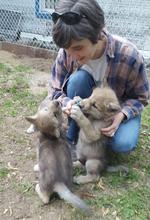
INTERDISCIPLINARY CENTER FOR BIOETHICS: ANIMAL ETHICS WORKSHOP
Abstract: Dogs and wolves behave very differently towards humans. Where dogs are eager to follow us, wolves typically slink away at the first sight of a person. Despite these clear behavioral differences, dogs and wolves are genetically close enough to breed, yielding fertile offspring known as wolf-dogs. Small changes in the timing of early development can explain differences in dogs’ and wolves’ responses to us. I study differences in an early developmental period called the primary critical period of socialization, when the brain is developing rapidly and social behaviors are forming. Behavioral data indicate that the timing of this interval shifted when dogs descended from their lupine ancestors, suggesting possible regulatory changes in underlying genetic pathways. In this talk I will discuss my current work with dogs, wolves, and wolf-dogs aimed at identifying the genomic factors that regulate the primary critical period of socialization against the backdrop of an otherwise very similar genome.
Kathryn Lord is a postdoctoral associate in the Karlsson Lab at The Broad Institute and the University of Massachusetts Medical School. Kathryn’s background is in the evolution and development of animal behavior, primarily using members of the genus Canis as a model species. Since receiving her doctorate in 2010, Kathryn has served as a visiting assistant professor of biology at Gettysburg College, and visiting assistant professor of animal behavior at Hampshire College. Dr. Lord aims to apply her background in evolution, development and behavior to better understand the genetic and epigenetic regulation of early postnatal behavioral developmental using dogs and wolves as a comparative model.
Open to the Yale community.